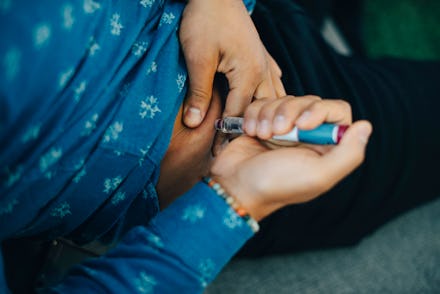A shocking number of trans Americans are forced to get hormones on the "grey market"

Transgender people in America who need hormone replacement therapy — HRT — face extraordinary hurdles to get health care. Many trans people are un- or under-insured to start with, and because being trans was classified as a mental health disorder up until 2018, insurance companies often denied claims for critical gender affirming care. As a result, many trans people have been forced to turn to risky DIY treatment methods. In fact, a concerning new study shows that 1 in 10 transgender Americans get hormones on the “grey market,” meaning they procure HRT outside of the manufacturers approved distribution channels.
The study, which was published last week in the medical journal Annals of Family Medicine analyzed a survey of 27,715 trans people conducted in 2015. The conclusions that researchers came to shed light on the unrelenting discrimination trans people face. As many as 9% of transgender people in the U.S. — about 170,000 individuals — use HRT they procured from “unofficial sources,” like friends, anonymous online hormone swaps, or shady pharmaceutical retailers.
The other findings from this study are equally upsetting. Eighty-three percent of respondents were interested in taking hormones, but only 55% were actually doing so. The researchers hesitated to draw conclusions about why, but their other findings indicate that insurance was a major barrier. Of those covered by insurance, over 20% had been denied insurance coverage for HRT.
The fact that trans people have rallied together to trade meds has recently been portrayed as a rebellious victory of resilience in the face of the pandemic. While it’s easy to read this resourcefulness as a heartwarming story of community, it’s also a tragic indication that we have a very broken healthcare system. No one should be forced to crowdsource their necessary medications, and this predicament also puts trans people in several dangerous positions.
Taking hormones without a prescription or any medical supervision comes with a laundry list of avoidable risks, Insider reported. Dosages could be off, or doses could be increased or decreased in response to availability in ways that affect a person’s health. Both estrogen and testosterone have been found to increase the risk of stroke and heart attack and new research shows that many trans people who receive HRT are often found to have unaddressed cardiovascular problems when they receive treatment. Because we have no idea how prevalent heart issues may be in trans people using DIY treatment methods, we also can’t know the severity of the risks they face.
But the dangers trans people face when they are forced to seek unsanctioned gender affirmation treatment aren’t just physical — they’re psychological, too. “Inconsistent quality or availability of hormones can also create an atmosphere of a fluctuating and tenuous access to embodying and fully experiencing one’s identity, which is alienating, demonizing, dehumanizing, pathologizing, and mood destabilizing,” says Dulcinea Pitagora, a queer, non-binary New York City-based psychologist and sex researcher.
Pitagora points out that in the best case scenario where a trans person has access to affirming and competent care, it can still be a harrowing experience. “Many trans people have had to jump through hoops and prove to gatekeepers that they are who they say they are,” Pitagora says. “Because discrimination is so prevalent, internalizing the stigma projected onto trans people is almost inevitable.”
Even the anticipation of poor treatment can create intense distress, Pitagora says, and the cumulative effects of being stuck in an oppressive and demeaning system can be life threatening. Pitagora says that trans people can be forced into a constant state of hypervigilance, in which constantly higher levels of stress increase levels of adrenalin and the stress hormone cortisol.
The result of this stress on the body can be a lower threshold to emotional and psychological triggers, dissociation, and it can exacerbate symptoms of anxiety and depression, which can all lead to suicidal ideation, Pitagora says. “These issues are of course magnified when the medication one needs isn’t accessible and has to be sourced in other ways,” they add.
This new research will, hopefully, lead to a more in-depth examination of the multitude of ways that health care must be improved for trans Americans and serve as the evidence that legal activists need to work towards systemic change. And I also hope that these dry statistics help more people understand the real and deep suffering that they bely. No one, in any place at any time for any reason, should have to endure so much to simply be who they are.